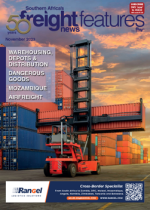There has been a remarkable increase in cargo shipments in Mozambique in recent years, and it’s showing no signs of slowing down. This uptick in traffic can be attributed to the f lourishing cross-border transportation activities between countries, and experts predict that this trend will continue to gain momentum.According to Tiago Pocinho, Rangel Logistics Solutions country manager for South Africa and Zambia, the phenomenon has been driven by several factors, including regional trade agreements, the growth of e-commerce, and the expansion of transportation infrastructure. "Mozambique is becoming an increasingly crucial connection point for trade between countries in the southern African region," he said. "Companies are investing in cross-border logistics and transportation to seize the business opportunities emerging in this rapidly evolving environment. This promising growth ref lects the growing importance of Mozambique as a regional logistics hub and underscores its pivotal role in intercontinental trade."Also, Rangel has invested heavily in its cross-border transport solutions. "We've bolstered our f leet to provide quicker and more convenient solutions for our customers. In the past year, we've also dedicated resources to enhance our specialised f leet for oversized and abnormal loads," said Pocinho. Additionally, the company has recently created an African mining division to expand its presence in Africa, along with a dedicated unit focusing on project cargo, abnormal loads, and heavy haulage. "These dedicated units enable us to offer customised and specialised transportation solutions tailored to our clients' needs."The company recently completed a project from Tete in Mozambique to Aggeneys in South Africa that entailed transporting large machinery and equipment. "This complex cross-border road transport operation utilised Rangel's trailers and trucks. The customs clearance process was remarkably efficient, thanks to our in-house teams and facilities in Tete and clearance offices in Komatipoort, situated on the Mozambique border," said Pocinho.Asked about challenges, he said infrastructure remained a persistent obstacle, despite recent significant developments and substantial investments. "There is still a long road ahead in addressing this issue, but we have confidence that the necessary steps are being taken to advance the country," said Pocinho.Furthermore, he pointed out another significant challenge – the shortage of a qualified workforce, which plays a vital role in ensuring the smooth functioning of logistics operations. Additionally, he highlighted the pressing security concerns in certain regions of Mozambique due to ongoing armed conf licts and instability. These areas demand heightened attention from logistics and transportation companies, necessitating agility and resilience to navigate potential disruptions in transportation routes."Despite the challenges, Mozambique is on a growth trajectory. In recent years, it has witnessed remarkable expansion in e-commerce, particularly in the wake of the Covid-19 pandemic. The emergence of various trade agreements among African nations has facilitated and encouraged cross-border services. In response, we've made substantial investments in this arena, establishing new offices in strategic border areas, including South Africa, Zambia, and Tanzania, to provide comprehensive coverage across the entire southern Africa region."

